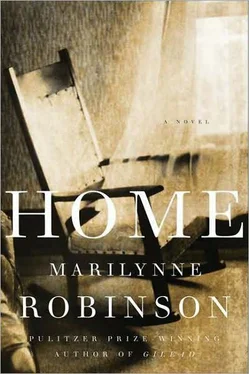She went to the barn and there he was, in the driver’s seat of the DeSoto, with his head tipped back and his hat over his eyes. She tapped on the window, and he roused himself and smiled at her, an effort. Then he reached over and opened the passenger door. “Hop in,” he said. “I was just collecting myself. Couldn’t face your papa quite yet.” Then he said, “Ah, little sister, these old fellows play rough. They look so harmless, and the next thing you know, you’re counting broken bones again.”
“What happened?”
“He preached. The text was Hagar and Ishmael, the application was the disgraceful abandonment of children by their fathers. And the illustration was my humble self, sitting there beside his son with the eyes of Gilead upon me. I think I was aghast. His intention, no doubt. To appall me, that is, to turn me white, as I am sure he did. Whiter.”
“Well,” she said, “I find this hard to believe. It just doesn’t seem possible.”
“Yes, yes, such a kind old man. I don’t think I’ll be asking your advice any time soon, Pigtails.” He laughed. “I left through the chancel. I had half a mind to pull my jacket up over my head.” Then he said, “Sweet Jesus, I am tired. And now you’re crying. Don’t do that, please.”
“It’s just tears,” she said. “They don’t matter. I’ll leave you alone if you want me to.”
“No,” he said. “Don’t do that either. Maybe you can help me sort this out.”
There was a silence.
“Well, for one thing,” she said, “I know he wouldn’t have mentioned you by name. He would never do that.”
“He didn’t say, ‘Jack Boughton, the notorious sinner in the first pew. The gasoline-scented fellow.’ That’s correct.”
“And he’d have prepared his sermon days ago. I’m sure he had no idea you would be there this morning.”
“Excellent point. In fact, I thought of that myself. But through the worst of it he wasn’t even speaking from notes, Glory. The old devil was extemporizing. Very effectively, I might add, for a man of his age. Anyway, I would have been on his mind while he worked on it. All that ingratiating behavior just beneath his window.” He laughed. Then he said, “Don’t cry.” He produced a handkerchief from the breast pocket in which he also carried the little leather case. One of her father’s beautiful handkerchiefs.
She said, “I’ll never forgive him.”
He looked at her. “I appreciate the sentiment.”
“I mean it. It could be senility, I suppose. I still won’t forgive him. He was always like a father to me.”
“It’s sad.”
“It’s terrible.”
Jack drew a long breath. “Consider our situation, Glory. Two middle-aged people in decent health, sane and civilized, generally well disposed toward the world — perhaps I am only speaking for myself here — sitting in an abandoned DeSoto in an empty barn, Snowflake not far from our thoughts, pondering one more thoroughly predictable and essentially meaningless defeat. Does this strike you as odd?”
She laughed. “It’s just ridiculous.”
“I had no plans when I left Gilead,” he said. “Survival on terms I could convince myself were tolerable. That was the pinnacle of my aspirations. I did not anticipate failure. I have awakened in the occasional gutter from time to time — figuratively speaking, of course — and I have thought to myself, Just a little effort would improve my situation dramatically. So there was that optimism. It may have been youth.”
“You were all right for ten years.”
“Almost ten. Seven and a half, if we are speaking of sobriety. Nine and a half, if the measure is a sometimes pleasurable engagement with life.”
“Della.”
“Della.”
They were quiet for a while.
He said, “I used to think we might slip into Gilead under cover of night, throw a little gravel at Ames’s window, say our I-do’s, get his blessing. Or at least his signature—”
“You’d have asked Ames to marry you?”
He shrugged. “He’s always awake at odd hours.”
“You’d have tipped your hat to the family homestead on the way out of town, I suppose.”
“No doubt. I never really thought through the fine points. I’m sure I would have tipped my hat.”
“That’s good to know.”
Then he said, “I came back thinking we might be able to make a life here, she and I. Why did I think that? I came here because everything had fallen to pieces and she had run off to her family.” He looked at her. “I wasn’t particularly at fault. I personally. Don’t get the wrong idea. But I was clutching at a straw, coming to Gilead. No doubt about that. I’ve had some experience with them. Straws.”
He looked at her sidelong. Bemused, worldly, sad, spent.
“You’ve never just talked to Papa about this.”
He laughed. “Some things are sacred, Glory. You’ve never talked to him about old Love Letters.” Then he said, “Our father is not a man of the world, shall we say, but he would no doubt assume that a nine-year relationship with my sullied self might have involved some degree of — cohabitation. I hope I haven’t offended you.” He glanced at her. “He might, never meaning to, only by implication, cast an aspersion. I don’t know how I would deal with that. I’m trying to stay sober.”
She said, “How do you know I didn’t do that? Cohabit.”
He said, very gently, “Call it a wild guess.”
Condescension, she thought. But kindly meant. Brotherly.
He said, “I don’t recommend it. There are laws. A person could end up with the cops at his door.” He smiled.
“Sorry.” Poor Jack.
The truth was, she wished there had been more to her endless supposed engagement. That there was not her fiancé’s extremely scrupulous respect for her to, in retrospect, embitter her sense of the fraudulence of it all. Still, she wished she had the letters back, and the ring. Sacred, she thought. Strange to think of it that way. Time and again she had read through the half dozen letters that moved her, and even they sometimes seemed so commonplace that it frightened her, as if a precious thing had been lost and she could not find it, search as she might. Then she would notice a phrase, something about loneliness or weariness or the view from a train window, the intimacy of the ordinary, and her heart would stir. She had ticked the margins beside these lines to spare herself the vertiginous sense that there was nothing in the letters at all worth cherishing, and then when she looked at them again she could not always see why she had chosen these passages, and again she would be frightened. He was at the center of her life, and who was he, after all? Why did it comfort her to trust him? The letters were so precious to her, and what were they? They were bland and prosaic, three readings out of four. But when they touched her, she was suffused with joy. There was no other word for it. She knew that if she had kept them, she would still look at them to see if there was anything in them to account for the sweet power they had had for her, and that if she did not find it, she would read them again. When she thought of them, she put aside all bitterness and folly and disillusionment, as no one else ever could, no one who listened to her with compassion. Sympathy would corrupt something wonderful, which secrecy and a kind of shame kept safe for her.
She said, “I’ve wondered if it might not be easier to be somewhere else. Where my life would be my own, at least.”
“My thought, too. And I gave somewhere else a pretty good try. Now I’m home again in Iowa, the shining star of radicalism. It is the desire of the tattered moth for the shining star that has brought me home, little sister.”
She said, “Well, Iowa is a pretty big state.”
Читать дальше












